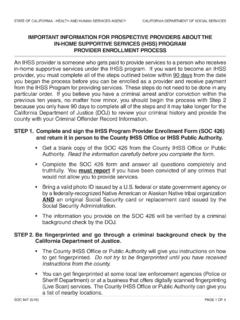Transcription of A Primer on CORI Reform For Employers
1 A Primer on CORI Reform For Employers Catherine E. Reuben Hirsch Roberts Weinstein LLP. 24 Federal Street, 12th Floor Boston, MA 02110. (617) 348-4316. 2013 Hirsch Roberts Weinstein LLP. 1. Contents I. What is CORI? What is CORI Reform ? .. 3. II. How do Employers get access to CORI?.. 4. III. What information can Employers get? .. 5. IV. Should Employers conduct CORI checks? .. 6. V. Can an employer be sued for negligent hiring if the employer chooses not to conduct criminal background checks? .. 6. VI. Can an employer face discrimination claims for conducting criminal background checks?..7. VII. Are Employers legally obligated to have a written policy with regard to criminal background checks?
2 9. VIII. If an employer is a unionized company, does the employer have a duty to bargain with the union about issues associated with background checks? .. 9. IX. May Employers ask applicants to voluntarily disclose information about their criminal record ? .. 9. X. What documentation does an employer need to submit to DCJIS in order to access an individual's CORI? .. 10. XI. If an employer obtains a CORI report or other report containing criminal offender record information about an employee or applicant, does the employer have to give that person a copy? .. 12. XII. Are there certain procedures an employer must follow before taking adverse action against an employee as the result of a criminal background check?
3 13. XIII. Do the requirements of the Fair Credit Reporting Act (FCRA) apply to CORI checks? .. 14. XIV. If an employer uses a third party to conduct criminal background checks, and complies with the FCRA, does the employer need to worry about CORI Reform ? .. 15. XV. Are there limits on the extent to which an employer can disseminate CORI? .. 18. XVI. Are there requirements with regard to retention, storage and destruction of CORI? .. 18. XVII. What can happen to an employer who violates the laws regarding CORI? .. 19. XVIII. Where can an employer turn for assistance in complying with CORI Reform and other laws related to criminal background checks?.. 21. XIV. Conclusion.
4 22. 2. A Primer on CORI Reform For Employers I. What is CORI? What is CORI Reform ? The acronym CORI stands for criminal offender record information . The term CORI. is commonly used to refer to the specific criminal offender record information that Employers , landlords and others can obtain directly from the Commonwealth of Massachusetts. In 2010, Governor Patrick signed a new law, commonly referred to as CORI Reform , . that vastly changed the legal landscape with respect to access and use of CORI. Among the changes was the creation of a new agency, the Department of criminal Justice information Services (DCJIS), 1 to oversee the authorized release of CORI, and to provide a public information system and network to support data collection and information sharing.
5 While CORI Reform deals largely with CORI obtained directly from DCJIS, the new law also impacts criminal offender record information obtained by Employers from other sources, such as private background check companies, consumer reporting agencies (CRA's), private detectives and court records. 2. Most of the key provisions of CORI Reform went into effect on May 4, 2012. DCJIS. issued CORI regulations, which became final on May 25, 2012. 3. It should be noted that many other states have laws and regulations regarding whether and how an employer can obtain and use criminal history information about existing and prospective employees. The Fair Credit Reporting Act (FCRA) imposes obligations as well.
6 This Primer deals exclusively with Massachusetts law, though some of the requirements of the FCRA are discussed below. 4. Note also that the Massachusetts Executive Office of Health and Human Services (EOHHS), the Board of Early Education and Care (EEC), the Department of Mental Health (DMH) and other agencies have their own regulations related to CORI. 5 Employers that are licensed and/or funded by such agencies must comply with these regulations as well as those issued by DCJIS. This Primer only discusses the DCJIS regulations. 1. This agency was formerly known as the criminal History Systems Board.. 2. MASS. GEN. LAWS ch. 6, 171A (requirements apply whether information is obtained from DCJIS or any other source ).
7 3. 803 CMR et seq. 4. See Parts XIII and XIV, infra. 5. See, , 101 CMR et seq., (EEOHS), 606 CMR et seq. (EEC), and 104 CMR et seq. (DMH). 3. II. How do Employers get access to CORI? Since May 7, 2012, DCJIS has been disseminating CORI through a new web-based service referred to as iCORI. 6 Under the prior CORI law, only certain Employers could get access to CORI. Effective May 4, 2012, any employer may register for an iCORI account to screen current and prospective employees, including full-time, part-time, contract, internship employees or volunteers. 7. To register for an iCORI account, the employer must provide identifying information regarding the individual user and the business as required by DCJIS.
8 8 The employer must also provide information regarding the purpose for requesting CORI, including any statutory, regulatory or accreditation requirements that mandate CORI or criminal history screening. 9. To complete the registration process, the individual user must agree to comply with all iCORI. terms and conditions. 10 Per the regulations, the individual must also complete training. 11. Specifically, individuals are required by DCJIS to certify that they have reviewed the training materials posted on the DCJIS website. 12 The regulations further state that a registration fee may be required. 13. All iCORI registrations expire after one calendar year. After expiration, the registrant must renew the registration, including again completing the iCORI training.
9 14 Employers that access CORI are subject to audit by DCJIS. 15. 6. 804 CMR and 7. MASS. GEN. LAWS ch. 6, 172(a)(3). The term contract employee is not defined in the statute or proposed regulations. 804 CMR (2) discusses an employer's ability to register for an iCORI account but does not reference contractors. 8. 804 CMR (2). 9. Id. 10. Id. 11. Id. 12. See DCJIS publication iCORI Quick Reference Guide: Register as an Organization.. 13. 804 CMR (2). 14. 804 CMR (6). 15. MASS. GEN. LAWS ch. 6, 172(c), (f) (CORI Acknowledgement forms and secondary dissemination logs are subject to audit by DCJIS). For more information on DCJIS audits, see Part XVII, infra. 4. III. What information can Employers get?
10 Effective May 4, 2012, any employer that registers annually for an iCORI account can get Standard Access to CORI. 16 Standard Access includes felony convictions disposed of (including any period of incarceration) within the past ten years, misdemeanors disposed of within the past five years and pending charges. 17 Standard Access also includes convictions for murder, voluntary and involuntary manslaughter, and certain sex offenses, regardless of how recent, unless sealed. 18 If a crime is eligible to be included on a CORI report, prior misdemeanor and felony convictions are available for the entire period that the subject's last available conviction record is available. 19 Standard Access does not include charges that did not result in a conviction, or offenses that are sealed, juvenile, civil or non-incarcerable.






